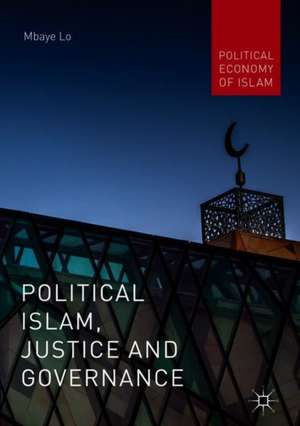Political Islam, Justice and Governance: Political Economy of Islam
Autor Mbaye Loen Limba Engleză Hardback – 20 noi 2018
Preț: 591.47 lei
Preț vechi: 695.84 lei
-15% Nou
Puncte Express: 887
Preț estimativ în valută:
113.19€ • 116.93$ • 94.20£
113.19€ • 116.93$ • 94.20£
Carte tipărită la comandă
Livrare economică 26 martie-09 aprilie
Preluare comenzi: 021 569.72.76
Specificații
ISBN-13: 9783319963273
ISBN-10: 3319963279
Pagini: 394
Ilustrații: XI, 386 p.
Dimensiuni: 148 x 210 mm
Greutate: 0.63 kg
Ediția:1st ed. 2019
Editura: Springer International Publishing
Colecția Palgrave Macmillan
Seria Political Economy of Islam
Locul publicării:Cham, Switzerland
ISBN-10: 3319963279
Pagini: 394
Ilustrații: XI, 386 p.
Dimensiuni: 148 x 210 mm
Greutate: 0.63 kg
Ediția:1st ed. 2019
Editura: Springer International Publishing
Colecția Palgrave Macmillan
Seria Political Economy of Islam
Locul publicării:Cham, Switzerland
Cuprins
1. Justice Versus Freedom: The Dilemma of Political Islam.- 2. From Liberal Freedom to Neo-liberal Inequality: The History of the Freedom Agenda.- 3. Freedom in Islamic Political Thought and Justice and Its Islamist Agents.- 4. From Political Islam to Militant Islam: The Pursuit of Justice.- 5. The Collapse of the Egyptian Revolution: Liberal Freedom Versus Islamist Justice.- 6. The Islamic State: The Rise of the Vigilante Justice.- 7. Turabi's Islamic Project: From the Rhetoric of Freedom to the Politics of Tamkeen.- 8. Morsi's Dilemma: The Shifting Sands Between Shar'iyyah and Shari'a.- 9. Conclusions: Beyond Justice and Freedom!
Notă biografică
Mbaye Lo is Associate Professor of the Practice of Asian and Middle Eastern Studies and Director of Duke in the Arab World Academic Program, Duke University, USA.
Textul de pe ultima copertă
This book argues that political Islam (represented by its moderate and militant forms) has failed to govern effectively or successfully due to its inability to reconcile its discursive understanding of Islam, centered on literal justice, with the dominant neo-liberal value of freedom. Consequently, Islamists' polities have largely been abject, often tragic failures in providing a viable collective life and sound governance. This argument is developed theoretically and supported through a set of case studies represented by the Muslim Brotherhood in Egypt (under President Muhammad Morsi’s tenure), Hassan Turabi's National Islamic Front in Sudan and The Islamic State in Iraq and Syria (ISIS). It is ideal for audiences interested in Regional Politics, Islamic Studies and Middle Eastern Studies.
Mbaye Lo is Associate Professor of the Practice of Asian and Middle Eastern Studies and Director of Duke in the Arab World Academic Program, Duke University, USA.
Mbaye Lo is Associate Professor of the Practice of Asian and Middle Eastern Studies and Director of Duke in the Arab World Academic Program, Duke University, USA.
Caracteristici
Argues that political Islam failed to govern effectively or successfully due to its inability to reconcile between the neo-liberal focus on individual freedom and Islamists' emphasis on a stultified, literal idea of justice Provides a theoretically developed argument supported by case studies about the challenges inherent to Islamist forms of governance Analyzes the intellectual history and institutions of political Islam in the Arabic speaking world












